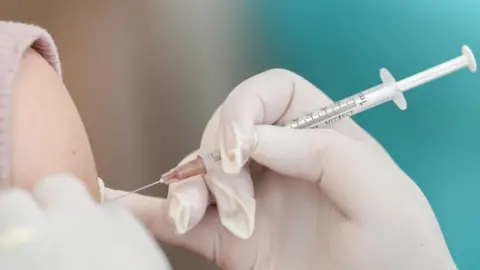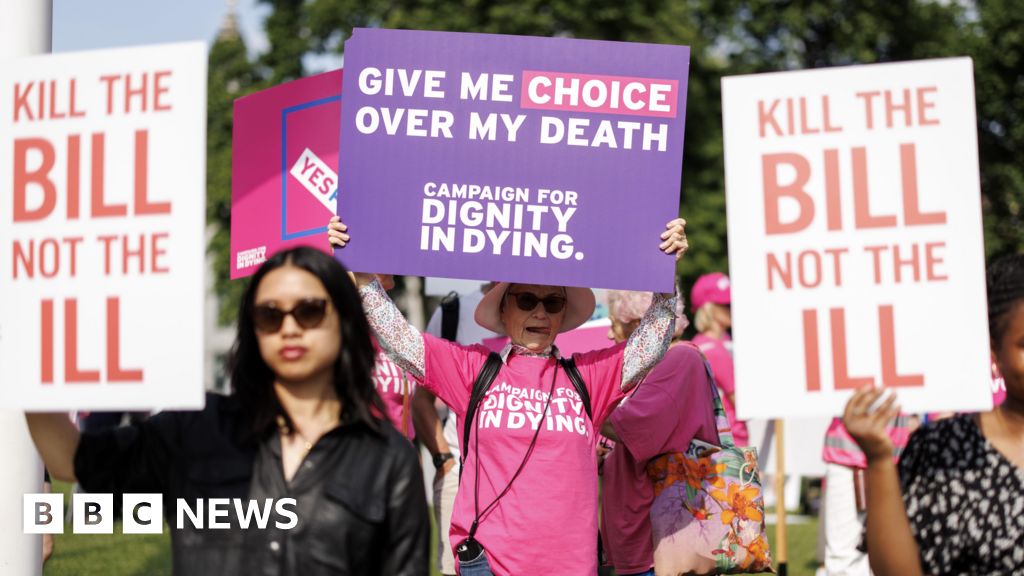BBC News, Yorkshire
 Facebook
FacebookYvonne Ford died from rabies last week after contracting it while on holiday in Morocco in February
Rabies was very rare in the UK but people should not "take for granted how safe we are", a top medic has warned following the death of a woman from the disease.
Yvonne Ford, 59, from Barnsley, died in hospital in Sheffield on 11 June after being scratched while stroking a puppy during a holiday to Morocco in February.
Her daughter, Robyn Thomson, said in a Facebook post that her mum had started experiencing symptoms two weeks ago, which began with a headache and eventually saw her unable to walk, talk, sleep or swallow.
Prof Andrew Lee, from the UK Health Security Agency (UKHSA), said it was vital that people planning to travel abroad should seek health advice and "get all their jabs in".
Mrs Ford had light contact with the stray dog while on holiday in February in the North African country, according to her family.
She was diagnosed with rabies at Barnsley Hospital after returning to the UK, and was later transferred to Sheffield's Royal Hallamshire Hospital where she died last week.

Prof Lee warned that while the UK was rabies-free, its threat still needed to be taken seriously
Prof Lee told the BBC that the UK itself had been "rabies-free since the early part of the 20th Century".
"We've not got it in our wild or domestic animals - with the exception of a few bat species, but that's really, really rare - and the cases we've had in the UK have been acquired abroad," he said.
He explained that once someone had contracted the virus, it could take a few months for the symptoms to emerge.
If people were bitten, scratched or licked by an animal with rabies while abroad, they should "try and wash the wound out as soon as you can and get medical treatment as soon as you can", Prof Lee urged.
"If you've had early treatment then generally the chances are pretty good that you will recover, but if you leave it too late and the disease sets in then it attacks nerves and then the brain and it can't be cured once it gets to that stage.
"If people don't get treatment early, and especially if they're not vaccinated, once the disease sets in there's little our medical colleagues can do and unfortunately it becomes fatal."
What is rabies?
 REUTERS/Athit Perawongmetha/File Photo
REUTERS/Athit Perawongmetha/File PhotoProf Andrew Lee, from the UKHSA, urged everyone travelling abroad from the UK to make sure they "get all their jabs in"
Rabies is a virus that causes an infection of the brain and nervous system in humansSymptoms of rabies usually take three to 12 weeks to appear - but they can appear after a few days or not for several months or yearsSymptoms include numbness or tingling where you were bitten or scratched, hallucinations, feeling very anxious or energetic, difficulty swallowing or breathing and paralysisIt is nearly always fatal when symptoms appear, but post-exposure treatment is "very effective" at preventing disease if given promptly after exposure to the virusThe NHS website also advises people to seek medical help immediately if they have been bitten or scratched, or if they have been licked on the eyes, nose, mouth or an open wound by an animal abroadSource: World Health Organization/NHS/UKHSA
Prof Lee urged anyone planning to go abroad on holiday to "make sure you get your travel advice and get all the right vaccines and protect yourselves and your loved ones".
"If there is one message, it is that here in the UK we take for granted how safe we are from infectious disease, but we forget that outside the UK in many countries some of these diseases are much more common, like rabies," he said.
"So it's important that people get travel health advice before they go abroad and make sure they get all their jabs in."
Prof Lee added that people should also "have your wits about you and just avoid the animals", particularly in countries where the risk of rabies is much higher, such as parts of Africa and Asia.
Six cases of human rabies connected to animal exposure abroad were reported in the UK between 2000 and 2024.














